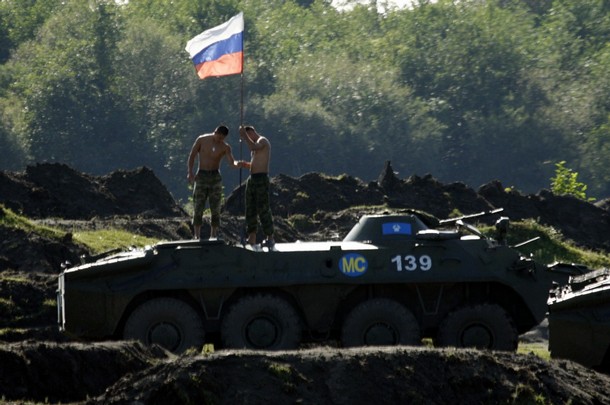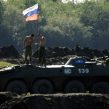
Nuclear Submarines Deployed to Deter U.S. Interference in Russia’s Confrontation with Georgia
Publication: Eurasia Daily Monitor Volume: 6 Issue: 151
By:

As the anniversary of the Russian invasion of Georgia in August 2008 approaches, the situation on the ceasefire line is becoming increasingly tense. Russia and its South Ossetian allies accuse Georgian forces of constant "provocations" (EDM, July 5). The E.U. Special Representative in the South Caucasus Peter Semneby told reporters in Tbilisi, "there is no need to dramatize the situation," over local incidents but "the virtual tension is greater than the real danger" (Novosti-Gruzia, August 5).
Western diplomats and politicians are trying not to anger Russia while attempting to defuse the confrontation before it escalates into a new war. Alexander Vershbow, Assistant Secretary of Defense for International Security Affairs, announced this week during congressional hearings, that the U.S. is not rearming the Georgian military while only providing some training and military reform assistance. However, Vershbow did not exclude possible U.S. arms supplies to Georgia in the future (AP, August 4).
Deputy Foreign Minister and State Secretary Grigory Karasin who is in charge of the South Caucasus in the Russian foreign ministry, publicly accused Vershbow of deceit. At a press conference in Moscow Karasin alleged that Vershbow "is not telling the full truth." According to Karasin, Russia has evidence that the U.S. and other nations are supplying arms to rearm Georgia. Karasin announced that Russia has no intention to "annex" South Ossetia or Abkhazia, but did not exclude a possible reunification in the future (RIA Novosti, August 5).
The Russian and South Ossetian militaries have fully closed the South Ossetian border with Georgia, because of the "continuing provocations." The state news agency ITAR-TASS cited a source in the defense ministry: "Our troops in South Ossetia, supported by our air force, will fully defeat the Georgian aggressors before they reach South Ossetia." The Russian forces in South Ossetia and units of the 4th North Caucasus Air and Air Defense Command (the former 4th Air Army) have been placed on heightened alert. The number of planes and pilots ready for immediate action has also been increased (ITAR-TASS, August 4).
Last week the defense ministry press service issued an ultimatum-style statement, accusing Georgia of mounting "provocations." The defense ministry announced that it retained the right to use "all available forces and capabilities" to defend South Ossetia and Russian servicemen if "the provocations continue" (www.mil.ru, August 1). The statement was issued on Saturday morning as President Dmitry Medvedev visited Kyrgyzstan together with the Defense Minister Anatoly Serdyukov and Foreign Minister Sergei Lavrov, while Prime Minister Vladimir Putin was in Siberia diving in a research submarine in Lake Baykal. According to Russian bureaucratic rules, this ultimatum-style statement must have been prepared and sanctioned by the leadership in advance, before they left the capital. The statement and the "provocations" it mentioned, might have been part of an overall plan to prepare a sequence of pretexts to allow military action.
This week it was reported that two Russian Akula-class attack nuclear submarines were recently deployed close to the U.S. East coast. These submarines known in Russia as Shyuka-B (project 971), are the best and most silent nuclear attack submarines. The Shyuka-B submarines carry torpedoes and long-range cruise Granat missiles with a range of up to 3,000 kilometers and a 200-kiloton warhead. According to U.S. defense experts, the Russian navy has not deployed nuclear attack submarines so close to the U.S. East coast for some 15 years. However, the Pentagon said that the deployment of the submarines did not violate international law (Reuters, New York Times, August 5).
The sharp increase in tension between Georgia and Russia and the deployment of the Akula nuclear submarines close to the U.S. mainland might not be coincidental. Moscow sees the confrontation with Georgia as a proxy standoff with the U.S. and NATO. In September 2008 after the August war, the Russian military staged major strategic exercises (Stability 2008) which outlined a local conflict escalating into an all-out air, sea and land war between Russia and the West that in turn erupts into a global nuclear conflict with the U.S. At the time Medvedev stressed, recalling the war with Georgia, "We have seen that an absolutely real war can erupt suddenly and local simmering conflicts, which are sometimes even called ‘frozen,’ can turn into a real military firestorm" (www.kremlin.ru, September 26, 2008).
Present Russian military planning envisages the limited first use of sea or air-based nuclear cruise missiles against targets in Europe and the U.S. to prevent local conflict from evolving into a full scale global nuclear war. The Akula submarines could threaten a sudden limited nuclear attack on Washington and other targets on the eastern seaboard to deter any possible U.S. interference if Russian forces again move deep into Georgia to change the present pro-Western regime of President Mikheil Saakashvili.
During the war last August the U.S. and its NATO allies sent warships to the Black Sea to demonstrate solidarity with Georgia. Now Russia seems to be trying to deter such pressure by deploying nuclear attack submarines with long-range cruise missiles off the U.S. coast.
Of course, no one in Moscow seriously considers a real nuclear war with the U.S., or even a limited one. However, Moscow believes that the West is meddling in its backyard by supporting a pro-Western regime in Georgia and seems ready to risk a serious confrontation to achieve regime change in Tbilisi.




